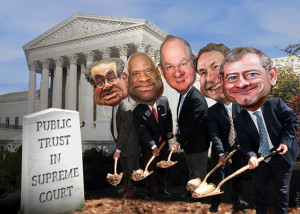
The U.S. Supreme Court’s conservative Republican majority
(This is the fourth installment in a series about differences between Democratic and Republican presidents in areas where they have direct control. See our Democratic vs. Republican Presidents category for the rest.)
For some voters, the president’s constitutional power to nominate U.S. Supreme Court Justices when vacancies occur is reason enough to vote for one political party or the other. But it goes much deeper than that. The president’s power to nominate all federal judges when vacancies occur is crucial to the direction of the country on nearly every issue, including marriage equality, guns, crime, civil rights, taxes, the environment, etc.
U.S. Supreme Court
Often, the U.S. Supreme Court is foremost on voters’ minds during elections. That’s because, while surprises occasionally occur, Republican presidents in recent decades almost always nominate Republican (i.e., conservative) judges to the Supreme Court, and Democratic presidents almost always nominate Democratic (i.e., more progressive) judges to the Court. Here are the most recent nominations:
President Barack Obama has nominated and got confirmed Sonia Sotomayor and Elena Kagan to the Supreme Court. President George W. Bush nominated and got confirmed John Roberts and Samuel Alito to the Supreme Court. President Bill Clinton nominated and got confirmed Ruth Bader Ginsburg and Steven Breyer. Ginsburg, Breyer, Sotomayor and Kagan are now the four minority “liberals” on the Court, and Roberts and Alito are two of the five majority conservatives (the others being Antonin Scalia and Anthony Kennedy nominated by Ronald Reagan, and Clarence Thomas nominated by George H.W. Bush. David Souter, also nominated by Bush Sr., has since retired). These current justices, and their immediate predecessors, have been involved in a slew of important 5-4 decisions that have done everything from picking a president to opening the floodgates for corporate money in elections to ruling that state gay marriage bans violate the Constitution. Conservatives also have the Federalist Society, which acts as a farm team to develop conservative judges and attorneys (John Roberts, Samuel Alito, Antonin Scalia, Robert Bork, Ted Cruz, John Bolton, John Ashcroft, Orrin Hatch, Kenneth Starr, etc.) and place them in high positions in government.
Lower Federal Courts
However, most cases never make it to the Supreme Court. Therefore, the president’s power to nominate judges to the 13 federal circuit courts of appeals (with about 179 judgeships) and approximately 97 federal district courts (with about 677 judgeships), where many more cases are decided, is critical. Alternatively, these lower court rulings often serve as a model for later Supreme Court decisions. And even when the Supreme Court does rule, often it remands cases back to these lower courts for adjudication. Additionally, there are other federal courts of special jurisdiction for which the president also gets to nominate judges. These include the U.S. Court of International Trade, U.S. Court of Federal Claims, U.S. Tax Court, etc.. These courts also decide important issues that affect most of us.
Finally, there is the Foreign Intelligence Service Court, established under the Foreign Intelligence Service Act of 1978 (FISA). The FISA Court handles sensitive cases involving surveillance of suspected terrorists. However, Americans have learned that the FISA Court has approved wholesale surveillance and data collection of Americans’ telephone calls, ordered by the National Security Agency (NSA) (whose director is another presidential nomination) and often undertaken by large telecom companies. The judges on the FISA Court are federal court judges hand-picked by the Chief Justice of the U.S. Supreme Court. Since the FISA Act became law, all three Chief Justices have been Republican presidential picks. Not surprisingly, the overwhelming number of FISA Court judges have also been conservative Republicans appointed by Republican presidents.
Senate Confirmation
Under the Constitution, the U.S. Senate votes to confirm or deny the president’s federal court nominations. While the Constitution calls this the “advise and consent” power, Republicans in recent years have used their role to block and delay President Obama’s nominations for no reason other than to hold onto power and hope that the next president is a Republican. The Republican Senate majority is confirming Obama’s judicial nominations at the slowest rate in 60 years. Last June, Republican U.S. Senate Majority Leader Mitch McConnell said that he would continue to slow-walk President Obama’s judicial picks purely for political reasons. Moreover, the resulting federal judicial vacancies can cause justice to be delayed and thus denied to many Americans. Thus, for Democrats, it’s crucial not only to keep the White House in Democratic hands, but to flip the Senate to the Democrats in the 2016 elections.
Image by DonkeyHotey, used under Creative Commons license. http://is.gd/Y48GqV


